Related Research Articles

Edington is a village and civil parish in Wiltshire, England, about 4 miles (6 km) east-northeast of Westbury. The village lies under the north slope of Salisbury Plain and the parish extends south onto the Plain. Its Grade I listed parish church was built for Edington Priory in the 14th century.

Chirton is a village and civil parish in Wiltshire, England, on the southern edge of the Vale of Pewsey about 5 miles (8 km) south-east of Devizes. The parish includes the hamlet of Conock, about half a mile west of Chirton village.

Wiltshire is a historic county located in the South West England region. Wiltshire is landlocked and is in the east of the region.

Wilsford is a small village and civil parish in the Vale of Pewsey in the English county of Wiltshire, about 4 miles (6 km) southwest of Pewsey.
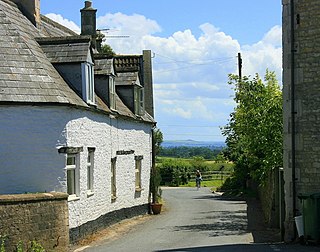
Atworth is a village and civil parish in west Wiltshire, England. The village is on the A365 road between Melksham and Box, about 2.5 miles (4 km) northwest of Melksham and 4 miles (6 km) northeast of Bradford on Avon. The hamlet of Purlpit lies east of Atworth village, and in the south of the parish are the small village of Great Chalfield and the hamlet of Little Chalfield.
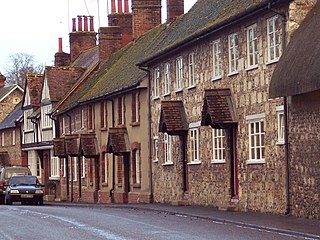
Berwick St James is a village and civil parish on the River Till in Wiltshire, England, about 7 miles (11 km) northwest of Salisbury, on the southern edge of Salisbury Plain. The parish includes the hamlet of Asserton. At the 2001 census the parish had a population of 185, reducing to 142 at the 2011 census.

Monkton Farleigh is a village and civil parish in west Wiltshire, England, on high ground 3 miles (5 km) northwest of Bradford-on-Avon, and a similar distance east of the city of Bath. The parish includes the hamlets of Farleigh Wick and Pinckney Green. In the west and northwest the parish is bounded by Somerset.

Edington Priory in Wiltshire, England, was founded by William Edington, the bishop of Winchester, in 1351 in his home village of Edington, about 3+3⁄4 miles (6 km) east of the town of Westbury. The priory church was consecrated in 1361 and continues in use as the parish church of Saint Mary, Saint Katharine and All Saints.

Upavon is a rural village and civil parish in the county of Wiltshire, England. As its name suggests, it is on the upper portion of the River Avon which runs from north to south through the village. It is on the north edge of Salisbury Plain about 4 miles (6.4 km) south of Pewsey, 10 miles (16 km) southeast of the market town of Devizes, and 20 miles (32 km) north of the cathedral city of Salisbury. The A345 and A342 roads run through the village.

In the Middle Ages, from the 11th century, the Cluniac order established a number of religious houses in the kingdoms of England and Scotland.
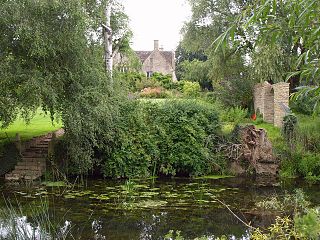
Monkton House in Broughton Gifford, Wiltshire, England is a Grade II* listed 16th-century house.

Monkton Farleigh Manor is a Grade I listed country house close to the village of Monkton Farleigh in Wiltshire, England. Built on the site of a Cluniac priory founded in 1125, the house is about 3 miles (5 km) northwest of Bradford-on-Avon and 4 miles (6 km) east of the city of Bath.
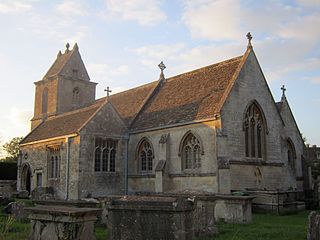
South Wraxall is a village and a civil parish in Wiltshire, England, 2.5 miles (4.0 km) north of Bradford on Avon. The village is to the east of the B3109 road from Bradford on Avon to Corsham.
Humphrey II de Bohun of Trowbridge Castle in Wiltshire and of Caldicot Castle in south-east Wales, 4th feudal baron of Trowbridge, was an Anglo-Norman nobleman, the third generation of the Bohun family settled in England after the Norman Conquest of 1066.

Humphrey I de Bohun, of Trowbridge Castle in Wiltshire, jure uxoris 3rd feudal baron of Trowbridge, was an Anglo-Norman nobleman who by his lucrative marriage became "the founder of the fortunes of his family", later prominent in England as Earls of Hereford and Earls of Essex. He is usually enumerated "Humphrey I" even though following his father he was the second "Humphrey de Bohun" settled in England. He has even been called "Humphrey the Great".
Edward of Salisbury was a nobleman and courtier (curialis), probably part Anglo-Saxon, who served as High Sheriff of Wiltshire during the reigns of William I, William II and Henry I.
Avebury Priory was an alien house of Benedictine monks in Wiltshire, England, between the early 12th century and the Dissolution.
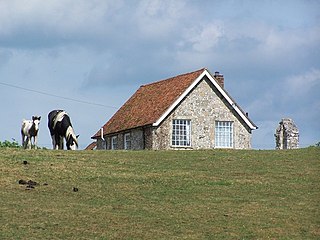

References
- 1 2 Pugh, R.B.; Crittall, Elizabeth (eds.). "Victoria County History: Wiltshire: Vol 3 pp262–268 – House of Cluniac monks: Priory of Monkton Farleigh". British History Online. University of London. Retrieved 21 May 2019.
- ↑ Historic England. "Remains of the Refectory at Monkton Farleigh Manor (1021833)". National Heritage List for England . Retrieved 2 June 2019.
- ↑ Historic England. "The Monk's Well conduit house (1019385)". National Heritage List for England. Retrieved 13 March 2015.
- ↑ "Image: The Monks' Conduit, Monkton Farleigh". Wiltshire Community History. Wiltshire Council. Archived from the original on 3 March 2016 – via Internet Archive.
51°23′20″N2°16′47″W / 51.3890°N 2.2798°W